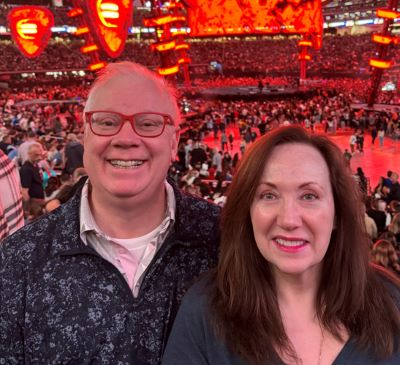Ken Hunt is the kind of corporate hired gun who specializes in showing companies how to operate more efficiently and increase their bottom line. A management consultant based in Chicago, he exudes a “can do” attitude. He says he’s in the persuasion business. “I’ve reached the level where I’m convincing people to change their behavior,” he says, whether that means tossing old suppliers or overhauling outmoded systems.
His work takes him around the world and, at 62, he’s still very much in the game, despite an unexpected health battle that began in late 2015 and still affects his life today.
“I was traveling home from a trip to Las Vegas when I felt some pain in my ankle,” he recalled. Doctors treated him with steroids and antibiotics, but the pain persisted, a mystery that puzzled Hunt. “I’m a problem-solver,” he said. “Tell me the problem, and we will find a solution.”

It took three months and a battery of medical tests — an ultrasound, computed tomography scan and ultimately a needle biopsy — to figure out his problem: Hunt had a case of leiomyosarcoma in his right leg, near the ankle.
Leiomyosarcoma is a rare and aggressive form of soft-tissue cancer that develops in smooth muscle cells. It frequently develops in the uterus, intestines, stomach and bladder, but can appear anywhere.
“I was actually relieved,” recalled Hunt. After wondering for months, he finally had a concrete diagnosis, and his “can do” mentality kicked in. “Now I wanted to know the options to fix it.”
By far the best option was to surgically remove the tumor plus a wide margin of additional tissue. “Surgery is still the only curative treatment” in this kind of situation, said Mark Agulnik, M.D., section chief of Sarcoma Medical Oncology and professor in the Department of Medical Oncology & Therapeutics Research.
That meant Hunt’s foot and ankle would have to be amputated. He had the surgery in Chicago in January 2016 and was fitted with a prosthesis. He hoped that would be the end of it, and for more than two years, everything seemed fine.
But in mid-2018, Hunt noticed a lump in his neck. His leiomyosarcoma had returned, and tests showed it was now Stage 4: The cancer had spread to his skin and into his lungs, where more than 60 nodules were detected. Surgery wouldn’t help now, but chemotherapy and other drug treatments might arrest the growth of the malignancy and possibly shrink it.
Seeking Expertise After Cancer Spreads
This is when Hunt met Agulnik for the first time. Agulnik, who would join City of Hope® in 2020, was a fixture at Northwestern University Feinberg School of Medicine for more than 15 years. At their first meeting in Chicago, Hunt was immediately impressed.
“I love Dr. Agulnik,” he said. “He’s a very relatable guy. He answers the tough questions.” And he had a plan. “He said, ‘This is our best treatment. We’ll try it first, and if it doesn’t work out, we have others.’”
Agulnik started Hunt on a combination of doxorubicin, the chemotherapy drug most commonly used for leiomyosarcoma, plus the relatively new (Food and Drug Administration-approved in 2016) olaratumab, a monoclonal antibody that targets the PDGFR-alpha protein expressed by certain tumor cells. Eight cycles of this combo did the trick. “It was very effective in stabilizing Ken’s cancer,” said Agulnik.
Until it wasn’t.
By mid-2021, Hunt’s cancer was growing again. By this time, Agulnik had left Chicago. Other oncologists at Northwestern put Hunt on a Phase 3 clinical trial of a targeted therapy drug called anlotinib, a tyrosine kinase inhibitor that slows tumor growth. It worked for about nine months, but then the cancer reasserted itself yet again. His doctors recommended more chemotherapy. Hunt wasn’t sure.
This is where fate, serendipity or perhaps just simple persistence brought Hunt and Agulnik back together, this time at City of Hope in early 2022.
“I was working on a project in Southern California,” Hunt recalled. “So out of the blue, I called City of Hope and tried to reach Dr. Agulnik, to see if I could get a second opinion.” They hadn’t spoken in more than a year. Hunt didn’t reach Agulnik, but left a message.
“And Dr. Agulnik calls me back!” he continued. “’Hey, Ken!’ he says, ‘What’s going on?’ So I fill him in and he says, ‘Where are you? I have this new clinical trial that would be perfect for you.’”
It was indeed a happy reunion, and a productive one. Hunt enrolled in Agulnik’s Phase 2 clinical trial of another tyrosine kinase inhibitor called cabozantinib in combination with the chemotherapy drug temozolomide. He began treatment in April 2022.
There was one more component to the treatment plan.
Airplanes.
Clinical trials require the patient receive the drug directly from the investigating team. It cannot be done remotely or through a third party.
And so, once a month, Hunt summoned that “can do” mindset and took the four-hour flight from Chicago to Los Angeles to meet with Agulnik and get his treatment.
“I flew in on Sunday,” Hunt explained. “I’d arrive at City of Hope at 6 a.m. Monday morning for tests. By 8:30, they had the results, I got my new meds, and I headed back to LAX.”
He didn’t mind the long commute. He likes the atmosphere at City of Hope (“Everybody is so knowledgeable and caring”) and he appreciated the opportunity to reconnect with Agulnik, whom he calls “a great guy. We share stories about concerts, wine, restaurants.” Not just cancer talk.
Standard operating procedure, says Agulnik.
“I found out early on that people don’t want to talk just about their disease. You need to see the whole person. You can’t treat them if you don’t have enough information about who they are.”
Trusting His 'Captain'
At first, Agulnik’s trial worked exceedingly well. After 18 cycles — and a lot of frequent flyer miles — Hunt’s tumors shrank by 28%. But in October 2023, tests found that Hunt’s sarcoma had spread to his left arm, left thigh and right calf. Agulnik pivoted Hunt’s treatment to an FDA-approved chemotherapy drug delivered via a 24-hour “fanny pack IV” that attaches to his port. While Agulnik set up the chemo protocol and remains “team captain,” Hunt is receiving his chemo infusions at home in Chicago now, with a plan to check in with Agulnik via video every three months and to visit in person in early 2024.
“So far, I am feeling good, just sleeping more and I have a little less stamina going up stairs, etc.,” Hunt said. “But I’m feeling positive. I’m looking forward to my first CT scan to see if the new chemo is working.”
Half the people diagnosed with advanced leiomyosarcoma don’t survive five years. Agulnik says Hunt’s remarkable progress bodes well for his future, and it can serve as an inspiration to others.
“Ten percent of these patients do better than anyone else,” said Agulnik. “He’s in that category, and there’s no reason to think he won’t continue. Here’s someone diagnosed in 2018 with metastatic disease who has exceeded his prognosis, so there’s no reason someone newly diagnosed couldn’t do the same.”
Hunt is just fine with that assessment, though he’s realistic about his prospects.
“I’m just going to keep doing what I’m doing,” he said. “Enjoy life as much as I can with my wife and family. I’m mostly asymptomatic; still very active, traveling, focused on experiences and quality of life. Dr. Agulnik says if these meds ultimately fail, he has half a dozen more trials coming.”
“I am thankful to be surrounded by lots of love and lots of support — especially from my wife and my family. It’s important to stay positive,” Hunt continued. “Don’t look backward. Look forward. Cancer is not a happy thing. Surround yourself with a team as caring and knowledgeable as City of Hope.
“Hey, you gotta trust somebody! I trust Dr. Agulnik.”
